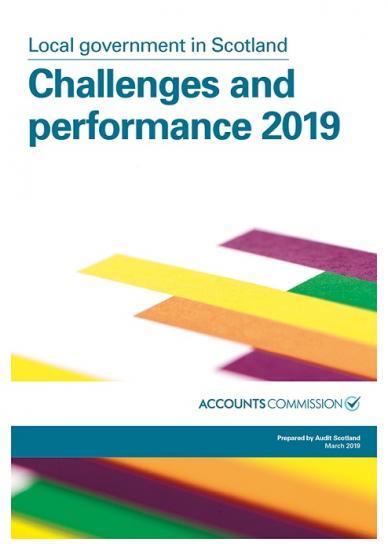Local Government In Scotland: Challenges And Performance 2019
21st March 2019

Councils must continue to change to address gap between demand and resources.
Scotland's councils are managing to improve and maintain most services. But Scottish Government funding to councils is likely to reduce in future; this, combined with increased demand and less flexibility over spending decisions, means councils need to think differently about how they deliver services to the public.
The Local Government Overview 2019 report by the Accounts Commission, the local authority watchdog, says some services are beginning to show signs of pressure and change is needed to tackle a growing gap between demand and resources. Nearly 70 per cent of councils' spending is on social care and education, and more money is being committed to Scottish Government priorities. This leaves councils less flexibility in where to spend and where to save.
At the same time councils are facing increased demand. All councils will see a continued rise in the number of people aged 65 and over, and ten councils an increase in the number of children under 15.
Graham Sharp, chair of the Accounts Commission said:"It's important to recognise that councils are working hard to maintain and, in some cases, improve services. Now fundamental change is needed to ensure services meet the shifting demands of local communities, with councils working and collaborating with communities to deliver the change needed. Councils must now focus on changing how front-line services are designed and delivered."
Read the report at - http://www.audit-scotland.gov.uk/uploads/docs/report/2019/nr_190321_local_government_performance.pdf
Key messages
1. Councils face an increasingly complex, changing and uncertain environment which places different demands and expectations on them. Councils are also central to delivering many high-level public sector objectives, such as the integration of health and care services and involving citizens more in decisions about public services.
2. These reforms require councils to collaborate with partners, with the third sector and with communities, to think differently about how they deliver and fund services. Thinking differently about services is important to meet the growing and changing needs of their communities in the coming years. New ways of working can lead to increasingly complicated lines of accountability.
3. Scottish Government revenue funding to councils has reduced in real terms between 2013/14 and 2019/20, while national policy initiatives continue to make up an increasing proportion of council budgets. This reduces the flexibility councils have for deciding how they plan to use funding. At the same time, demands for council services are increasing from a changing population profile. All councils expect an increase in the proportion of people aged over 65 and almost a third of councils expect an increase in the proportion of children under 15.
4. Councils have made good progress in developing medium-term financial planning and continue to manage their funding gaps through savings and use of reserves. All councils increased council tax to the maximum three per cent in 2018/19 and many increased their fees and charges to raise income. Some councils are looking at other options to raise income.
5. Councils need to ensure they have the staff, skills and leaders to deliver change. This requires effective workforce planning, but the quality of planning is inconsistent across councils. An increasing proportion of the workforce is nearing retirement. If there is insufficient succession planning, skills and knowledge will be lost as these people retire. Recruitment into some service areas is becoming increasingly difficult, but national workforce data is insufficient to clearly understand how individual services areas are affected.
6. Despite reducing funding and increasing demands, across local government most performance indicators are improving or being maintained, although some service areas show more strain. There remains performance variation among councils that cannot be readily explained by differences in context or spend. Better use of data and benchmarking could lead to further improvement and efficiencies.
Recommendations
While councils have continued to find ways to manage funding gaps and have made good progress with medium-term financial planning, they face an increasingly complex, changing and uncertain time ahead. To continue to improve the outcomes for their communities within this context, councils need to be open to transformational change and implement new ways of working.
To make effective progress councils should:
• assure themselves that they have adequate leadership and management capacity in place. This should include development arrangements that prepare and support councillors and senior managers to respond to the challenging and changing local and national demands
• undertake long-term financial planning to set out how they will deliver national policy commitments, while continuing to sustain local services with reducing budgets and increasing demands
• continue to seek and implement innovative ways of working and collaborate with communities, partners and the third sector to drive transformational change
• improve data to:
help inform the difficult decisions councils have to make
support benchmarking, learning and sharing of experience and effective practice with others that will contribute to improving service quality, efficiency and outcomes for communities
• ensure they have workforce planning that is clear about the workforce needed now and in the future, where the gaps are and what training or other action is needed to fill them. This should be supported by better workforce data
• be able to demonstrate how spending decisions and priorities have impacted on service delivery and the outcomes of residents, as well as how they are delivering against the national performance framework.
Other Recent Audit Scotland Reports
Health and Social Care Integration - November 2018
Councils Use of Arms Length Organisation - May 2018
Financial Overview 2018 - November 2018
Highland Council Annual Audit - Year ended 31 March 2018
